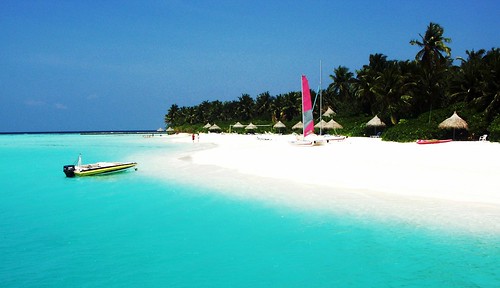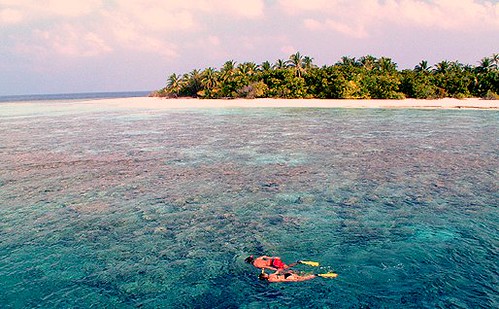
The state (en-us-Maldives.ogg /ˈmɒldaɪvz/ (help·info) or /ˈmɒldiːvz/), (Dhivehi: ދިވެހިރާއްޖެ Dhivehi Raa’j) or Maldive Islands, officially the Republic of Maldives, is an island land consisting of a group of atolls stretching southward of India's Lakshadweep islands between Minicoy Island and the Chagos Archipelago, and about seven cardinal kilometres (435 mi) south-west of Sri Lanka in the Laccadive Sea of Indian Ocean. The twenty-six atolls of state encompass a region featuring 1,192 islets, of which digit cardinal islands are inhabited.
The example inhabitants were Buddhist, belike since Ashoka's period,[citation needed] in the 3rd century BC. Mohammedanism was introduced in 1153. The state then came low the influence of the Portuguese (1558) and the Dutch (1654) seaborne empires. In 1887 it became a British protectorate. In 1965, the state obtained independence from Britain (originally low the study \"Maldive Islands\"), and in 1968 the Sultanate was replaced by a Republic.
The state is the smallest Asian land in cost of both population and area; it is the smallest predominantly Islamic commonwealth in the world. With an average ground take of 1.5 metres (4 ft 11 in) above sea level, it is also the land with the minimal maximal point in the world, at 2.3 metres (7 ft 7 in).
capital municipality of state known as the smallest municipality in the world more than 90,000 peoples, 500 ft up in the air...

A wave in the Amerindic Ocean caused by the 2004 Amerindic Ocean earthquake caused serious damage to the socioeconomic infrastructure which left many grouping homeless, and permanent damage to the environment. After the disaster, cartographers are planning to redraw the maps of the islands due to alterations caused by the tsunami.

Rush Hour in the Maldives by Danburg Murmur
On 22 April 2008, then Maldives President Maumoon Abdul Gayoom pleaded for a cut in global greenhouse gas emissions, warning that rising sea levels could submerge the island nation of Maldives. In 2009, subsequent president Mohamed Nasheed pledged to make the Maldives carbon-neutral within a decade by moving to solar and wind power.

The reef is composed of coral debris and living coral. This acts as a natural barrier against the sea, forming lagoons. Other islands, set at a distance and parallel to the reef, have their own protective fringe of reef. An opening in the surrounding coral barrier allows access to the calmer lagoon waters.

Blue Lagoon View. Maldives Nature.

Snorkelling in the Maldives. Coral Reefs, Opportunity to observe Underwater life in a Natural setting.

The state was largely terra incognita for tourists until the primeval 1970s. Strewn across the equator in the Indian Ocean, the state archipelago possesses an exceptionally unique geographics as a small island country. Nature has broken the archipelago into 1,190 tiny islands that occupy a mere one per cent of its 90,000 sq km territory.
Only 185 islands are home to its 300,000 population, while the another islands are used entirely for economic purposes of which business and agriculture are the most dominant.Tourism accounts for 28% of value and more than 60% of the Maldives' external exchange receipts. Over 90% of government tax income comes from import duties and tourism-related taxes.[citation needed].
The development of business has fostered the overall growth of the country's economy. It has created direct and indirect employment and income generation opportunities in another related industries. The prototypal tourist resorts were unsealed in 1972 with Bandos island use and Kurumba Village.
According to the Ministry of Tourism website,the emergence of business in 1972 transformed the economy of the Maldives, moving rapidly from the dependency on the fisheries facet to the business sector. Just in threesome and a half decades, the industry has become the important source of income and livelihood of the grouping of the Maldives.
Tourism is also the country’s biggest external currency earner and the azygos maximal presenter to the GDP. Today, there are 89 resorts in the state with a bottom capacity of over 17,000, providing world class facilities for tourists whose period arrival figure exceeds 600,000.
The report publicised in Dhivehi language, mentions that the sort of resorts has accumulated from 2 in 1972, to 92 by the end of 2007. Up to 2007, a total of 8,382,928 tourists have visited Maldives.

Underwater restaurant in Maldives (Conrad Maldives Rangali Island), the first totally underwater restaurant in the world. You have to book a table two weeks before you go there to make sure you get one, there are only 7 tables and it cost around 700$ US for two but it was worth it
No comments:
Post a Comment